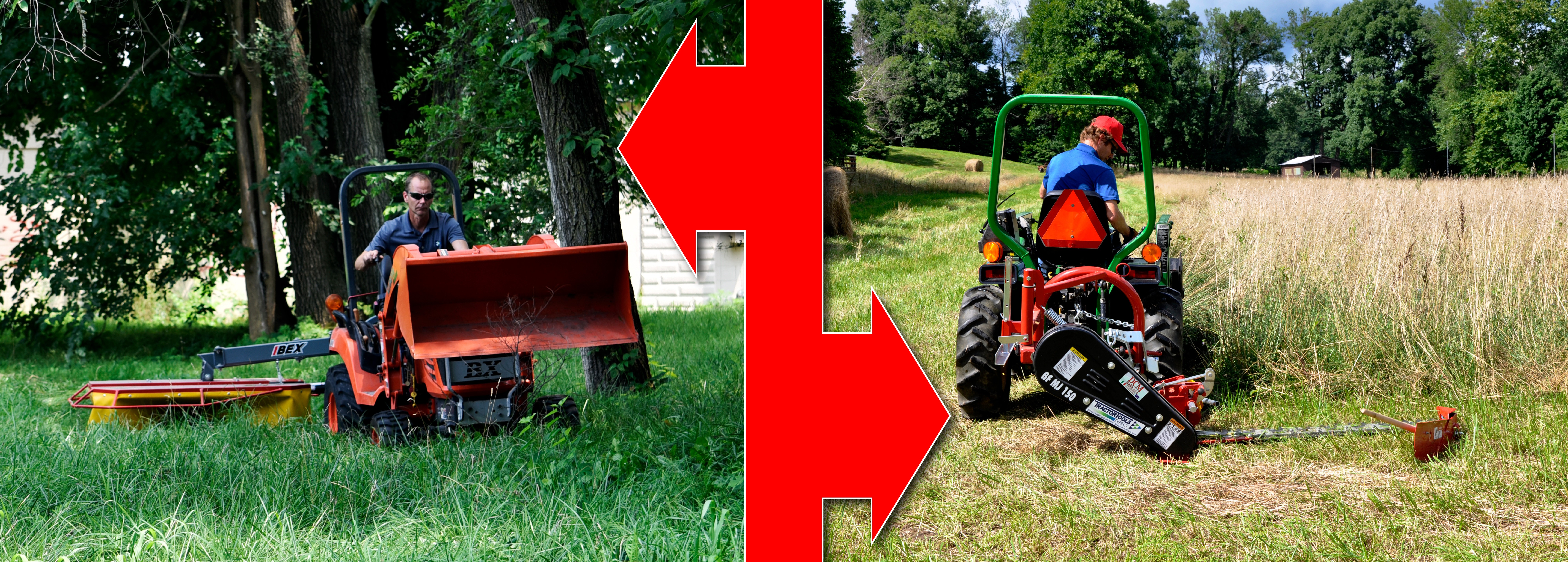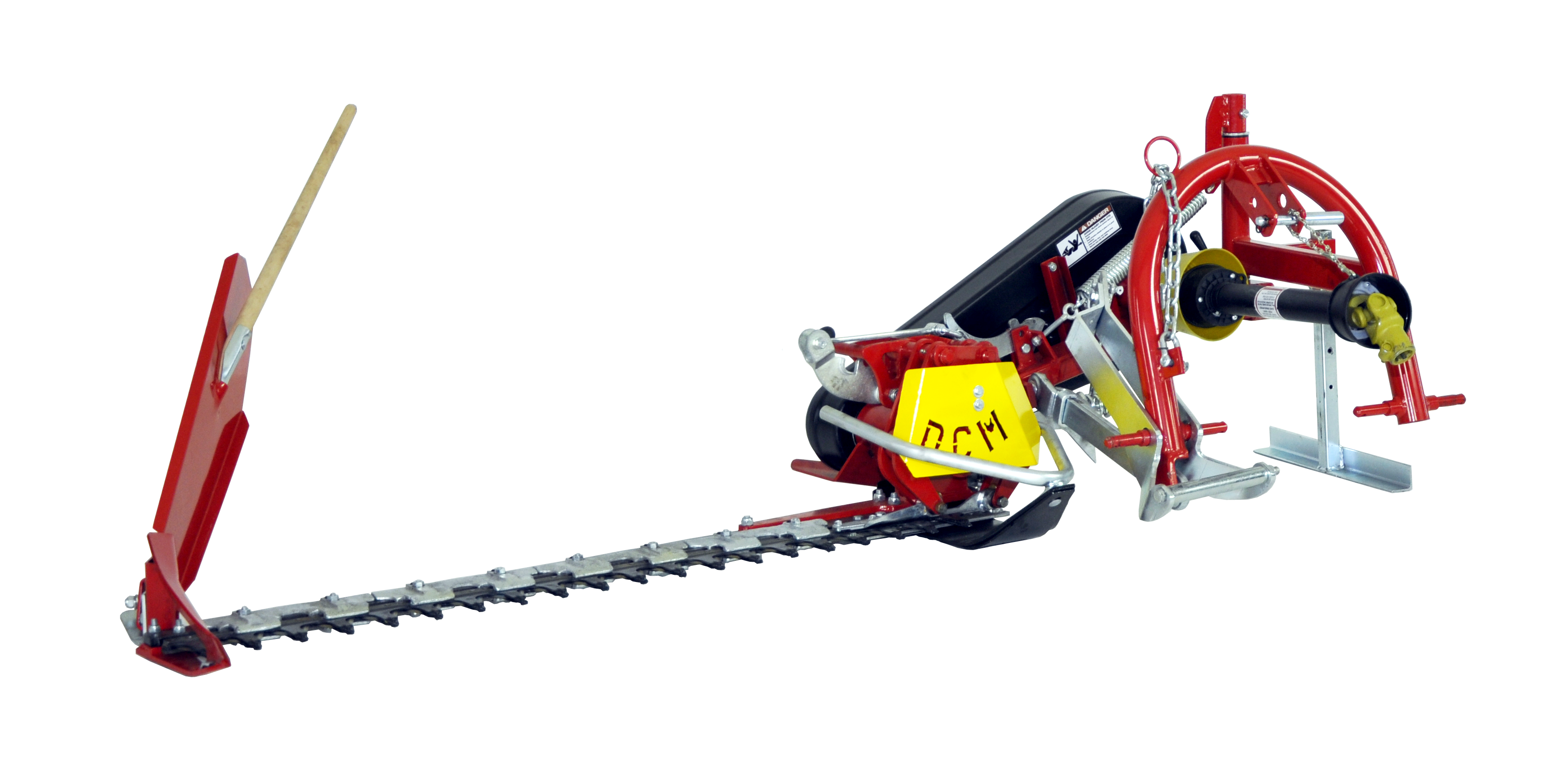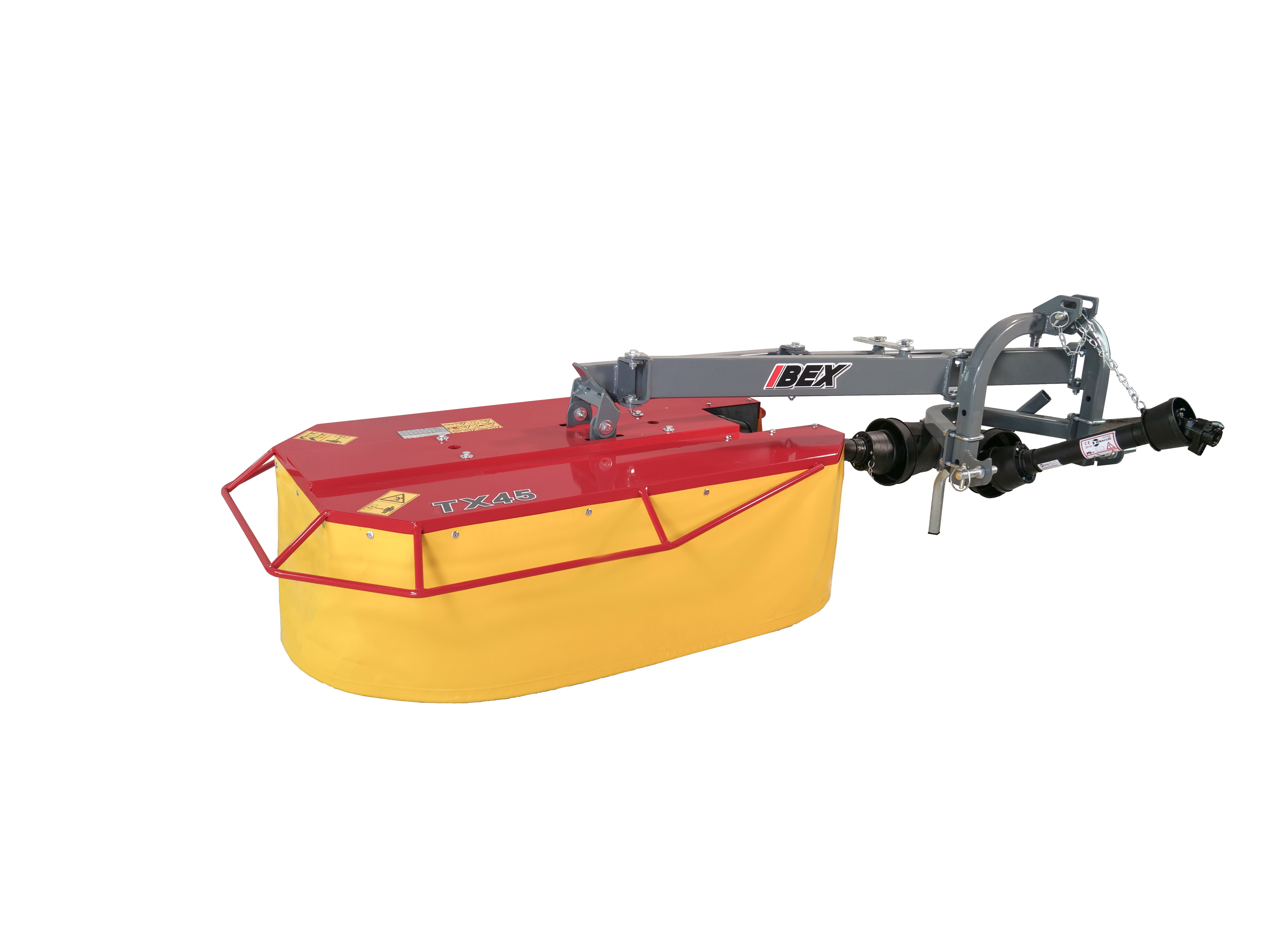Drum Mowers vs Sickle Bar Mowers: Drum Mowers Win!

Here at Tractor Tools Direct, we receive many inquiries about sickle bar mowers. While at one time we included them in our inventory, we stopped supplying them in 2021. This blog will discuss the reasons why and include details on drum mowers – mowers we have found to be superior to sickle bar mowers and much better matches for our customers’ needs, especially in the hay field.
Sickle bar mowers, though their design is a bit antiquated, do have a place on a small farm. As the first mechanical hay mowers, they were originally pulled by horses. These mowers work with a reciprocating action, moving triangular blades back and forth between stationary guard fingers. Like a set of barber’s clippers, each back and forth action shears off any grass or vegetation that is between the stationary fingers. However, this design tends to make them high maintenance machines.
Sickle bar mowers can be used for cutting hay as well as for other general light mowing duties and can be operated by tractors with as little as 15 horsepower. They are good for angled cutting along ditch banks and roadsides; however, if the material is at all thick, an offset flail mower would likely be a better choice for this task. Sickle bar mowers also cut with relatively little motion which means less dust in a hay field and less chance of thrown objects like rocks and debris – though this can be a disadvantage since the grass lands in a flat swath and may require more drying time.
With years of experience here at Tractor Tools Direct, we have found that the disadvantages of sickle bar mowers outweigh the advantages for most small-farm operators – especially those wanting efficient hay cutting with little down time.
The disadvantages of a sickle bar mower include:

- Slow forward speed – A sickle bar mower’s forward speed is much slower than that of a drum mower. A sickle bar mower can mow a wide swath, but its speed is only about half that of other designs.
- Less robust build – A sickle bar mower has many small, light-weight moving parts that are close to the ground. Hitting an obstruction with a sickle bar mower is more likely to cause catastrophic damage than other types of mowers. A sickle bar mower cannot handle cutting thick material, which is likely to result in quick wear and/or damage.
- Susceptibility to clogging – A sickle bar mower becomes easily clogged when working in very dense, lodged, or already cut material. Clogging is also more of a problem when blades begin to dull.
- Cumbersome blade replacement – When blades become dull, replacing them usually requires special tools and mechanical know-how and can be time consuming and expensive.
- Higher repair expenses – Damage due to hitting an unknown obstruction can be expensive to fix. The mower’s many small parts must work together in perfect unison. Therefore, if one part becomes damaged, it is likely to result in a cascading, expensive failure.
For the above reasons, we dropped sickle bar mowers from our inventory. With these mowers we found the occurrence of operator error to be greater, the cost of parts replacement to be higher, and the incidents of breakage to be more frequent than with our drum mowers. We know that time is a precious commodity on a farm – being down in the hay field is not an option.
Our Ibex drum mowers are sturdy, low-maintenance machines designed for the compact tractors so popular on today’s small farms. Simple and durable, they are manufactured with fewer moving parts than sickle bar mowers and will cut faster with fewer problems. Their performance is unbeatable in the tough conditions of a hay field.
The design of a drum mower is mechanically much simpler than that of a sickle bar mower. A drum mower has only two large counter-rotating drums. These drums are powered from above by a simple gearbox. A drum mower uses only three or four inexpensive, reversible blades per drum. This simplicity in design makes a drum mower easier to use and maintain, while also making it more durable.
In summary, the advantages of a drum mower over a sickle bar mower include:

- Higher cutting speed – A drum mower can be run at double the speed of a sickle bar mower.
- Never clog – Two large counter-rotating drums create a great deal of inertia for powering through the thickest of hay conditions.
- Easier blade maintenance – A drum mower uses only 4 inexpensive, reversible blades per drum which can be easily sharpened or replaced.
- Greater durability – A drum mower is easily the most rugged of all hay mower types, rarely sustaining damage even from striking an unmovable object.
Overall, the advantages of drum mowers far outweigh those of sickle bar mowers on a small farm – especially for hay cutting. With their durability, efficiency, and ease of use and maintenance, our drum mowers have proven to provide the greatest return on our customers’ investments – of both time and money. Thus, we have narrowed our hay mower inventory exclusively to drum mowers.
To learn more about our line of Ibex drum mowers, please visit our website here or give us a call at 260-BALE-HAY today!
***Never fear! If you purchased a sickle bar mower from us in the past, we can still provide the support to keep it running. All manuals for these mowers can be found on our website as well as links to parts. We will also be happy to take your technical support calls when needed.***
Recent Posts
-
Haymaking for Horse Owners: What You Need to Know
For horse owners, few things are more important than quality hay. Horses are picky eaters with s …Jul 9th 2025 -
Yes! Cutting Height Matters in Haymaking
When it comes to haymaking, one of the most crucial decisions a farmer or producer must make is …Jul 1st 2025 -
Weather Watchers: The Role of Weather in Haymaking
When it comes to producing high-quality hay, few factors are more critical—or more u …Jun 24th 2025




